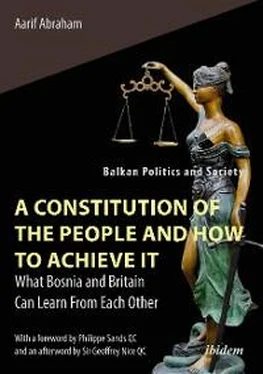ibidem-Press, Stuttgart
In tribute to my teachers
—past, present and future—
with particular gratitude
for my mother, aunty, and uncles
Contents
ACKNOWLEDGMENTS
FOREWORD
INTRODUCTION
1. “A text about a text”: constitutions of Britain and Bosnia
1.1 Searching for the soul of a state
1.2 Overview of the British constitution
1.3 Overview of the Bosnian constitution
1.4 Comparative constitutional histories
2. “Look a shoot is sprouting”: measuring culture
2.1 Political culture in theory
2.2 Political culture in practice
2.3 Political culture applied to Bosnia and Britain
2.4 Problem of political apathy
3. “Going back to whence I sprang”: assessing apathy
3.1 A-systemic orientations
3.2 Anti-systemic orientations
3.3 Absence of interpersonal trust
3.4 Institutions as an explanation
4. “We’ve still not found a cure”: constitutional rules
4.1 Constitutional choice and change
4.2 Recurrent crisis and rarefied reform in Bosnia
4.3 Rising strain amidst weak reform in Britain
4.4 Reform dilemmas and deadlock
5. “We need to uncover lost paths”: modelling change
5.1 Modelling intransigence
5.2 Modelling the failure of reform
5.3 Modelling successful evolution in the short run
5.4 Modelling future co-operation and participation
6. “A text about hope”: lessons from Bosnia and Britain
6.1 Debate, deliberation and participation
6.2 Lessons for Bosnia and post-conflict societies
6.3 Lessons for Britain and pre-conflict societies
6.4 Pathways out of constitutional quagmires
BEYOND LAW, PRESCRIPTIONS AND CONCLUSIONS
AFTERWORD
APPENDICES
GLOSSARY
REFERENCES
This book would not have been possible without the conversation, counsel and guidance of a great many friends and colleagues who have added immeasurably to my understanding of politics, law and international relations over the course of my academic and professional callings. Our interactions have made writing this book enjoyable and highly rewarding.
I am very grateful to Professor Philippe Sands QC, Sir Geoffrey Nice QC, Baroness Helena Kennedy QC, Hon. Dr Brett Mason, Dr Valery Perry, and Margaret Owen OBE for their contributions to this book, as well as their critical thoughts and reviews. A much better book is the result.
I am indebted, in particular, to my friends and mentors: Helena Kennedy, Geoffrey Nice, Valery Perry, Kyrie James and Salim Ibrahim. They have often given up their valuable time, without asking for anything in return, to help resolve dilemmas and difficulties. In this case, they have extended their kindness to tackle seemingly intractable ones in Bosnia and Britain.
I would like to give thanks to a number of colleagues who contributed directly to the preparation of this book. Valery Perry is a leading scholar on Bosnian constitutional reform. Without her constructive, challenging and critical comments whatever nuance and distinction there is in this book would have been lost.
I was very privileged to have been taught, and encouraged in my thinking about Bosnian constitutional reform, by the late Zdravko Grebo. He never once suggested that conventional thinking might be the answer to elusive endeavours in pursuit of peace and justice. As one of the young leaders of the first mass protests in Yugoslavia, he inspired many a mind to stand upright, and without fear, in the face of powerful and insurmountable behemoths. I hope I am a worthy student.
I had insightful discussions about constitutions with Dr Kurt Bassuener, Professor Daniel Sewer, and Ewelina Ochab. Kurt Bassuener provided much food for thought drawing upon his many decades of experience and scholarship on the Bosnian constitution.
Dr Rachel Kurian and Alina Trkulja provided useful comments and direction as to the structure of my original thesis and Dr Mansoob Murshed, a specialist in game theory, helped develop the models adopted in this book through his feedback.
I received very helpful critical suggestions on either the proposal or parts of the draft manuscript from: Dr Miles Jackson, Mark George QC, Andrew MacDowall, Dalila Sadinlija, Kate Young, George Mitchell, Kerim Suruliz, and Natasha Jackson. This book, in style and substance, is much improved as a result. Among the kind readers of the manuscript was Patrick Page. As a master of the written word, he led me on a testing, but extremely rewarding, journey in questioning all my defaults as to style. I am grateful to him.
Lily Lewis, through a fortuitous turn of events, assisted me with some further research on political culture in Bosnia and Britain and contributed to those chapters. I had remarked to Lily, knowing she had no prior connection with Bosnia, that it was no coincidence that the Golden Lily happened to be the symbol of Bosnia. I hope this book, and Lily’s contribution, will help add to the corpus of knowledge on good political culture and its cultivation, growth and bloom in both Bosnia and Britain.
Last but not least, I would like to thank my colleagues at Ibidem Press who have been unfailingly kind, supportive and helpful from proposal to publication: Jakob Horstmann, Valerie Lange, Dr Soeren Keil, and Dr Jelena Džankić.
Although the suggestions and comments of these readers greatly improved the final manuscript, I alone am responsible for the interpretations appearing in this book and for any flaws, errors or omissions that remain.
Aarif Abraham
Garden Court North Chambers
Manchester, February 2021
Fifteen years of involvement in international cases that followed the collapse of the Socialist Federal Republic of Yugoslavia, or SFRY, made me acutely aware of the particularities of the constitutional situation that faced Bosnia and Herzegovina, the sovereign State which emerged from that collapse. It also left me cognisant of the apparent differences with the situation faced by the United Kingdom of Great Britain and Northern Ireland.
I recognised that matters of history and politics, of culture and identity, will combine to weave distinguishable constitutional arrangements. Yet I also knew, not least from the research that went into my book East West Street, that a situation which exists at one moment in time can, within just a few years, change very radically. That was the case for the city of Lemberg, which had, in the late 1920s, a diverse and multinational population, but within two decades found itself with a totally different population.
As a part of the Austro-Hungarian empire, and then the SFRY, Bosnia was largely made up three majority communities—Bosnian Muslims, Catholics and Orthodox Christians. There were other minority groups too. As the SFRY dissolved, a violent conflict in Bosnia exposed all populations to such unimaginable horrors that—eventually and belatedly—the international community was catalysed into action. A ‘peace’ was negotiated, then concluded in 1995 at a military base in Dayton, Ohio. Out of this process a new constitution emerged.
Britain’s unwritten constitution, by contrast, is said to be ancient, one that establishes a parliamentary democracy that threads together the four ‘nations’ of Scotland, England, Wales and Northern Ireland. The composite constitution goes back many centuries, through and beyond empire. It is said to be unwritten and characterised by a particular flexibility.
The differences between Bosnia and Britain appear stark. What might be learned from an exercise in comparison?
Bosnia’s constitution was imposed. It is codified, rigid, difficult to amend. The people had no direct say in its creation, on the basis that they harboured “ancient ethnic hatreds.” The constitution is seen by some to institutionalise divisions that many believe to be debilitating. It seeks to ensure a formal equality of the three main ethnic groups, with strict rules on elite power-sharing, which some consider to undermine the freedoms and rights of individuals. Aarif Abraham poses some important and searching questions about a constitutionally-imposed system of group segregation, one that arose in the context of international crimes. If the people of Bosnia do not harbour supposed ancient hatreds but have a political culture that is democratic, tolerant and accommodating, he asks, might another constitutional future be envisaged? What circumstances might cause the different groups and their elites to abandon this structure for a different one? Can the people of Bosnia truly control their own democratic destiny within the current constitutional straightjacket within which they now exist?
Читать дальше












